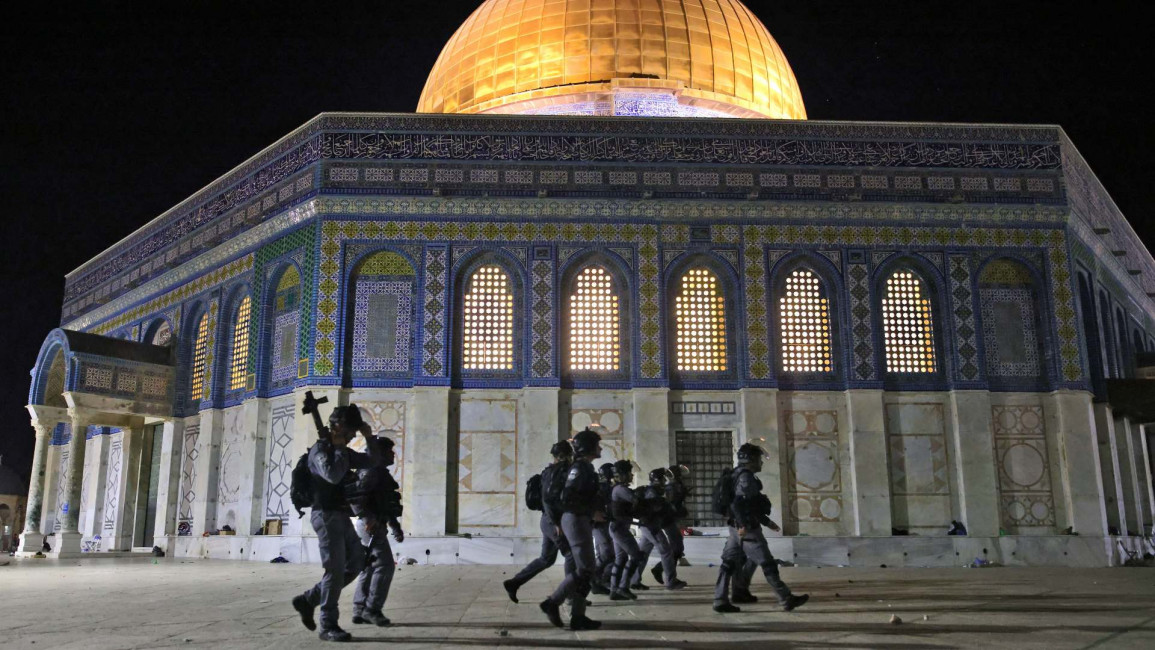200 Palestinians hurt after Israeli police storm Jerusalem's Al-Aqsa: medics
Nightly protests broke out at the start of the holy month of Ramadan over police restrictions at a popular gathering place and have reignited in recent days over threatened eviction of dozens of Palestinians from their homes in east Jerusalem, which has been occupied by Israel since 1967.
Dozens of Israeli riot police entered the Al-Aqsa compound, also known as the Temple Mount, on Friday evening as thousands of Muslim worshippers were holding evening prayers on the last Friday of Ramadan.
Police fired rubber bullets and stun grenades at worshippers, prompting Palestinians to hurl rocks at Israeli forces.
Israeli police entered one of the buildings in the complex, which contains the iconic golden Dome of the Rock.
The Palestinian Red Crescent emergency service said 88 of the wounded were hospitaliaed.
The Palestinian Health Ministry said 83 people were wounded by rubber-coated bullets, including three who were shot in the eye, two with serious head injuries and two with broken jaws.
The Israeli police said protesters hurled stones, fireworks and other objects at them, wounding six officers who required medical treatment. "We will respond with a heavy hand to all violent disturbances, riots and attacks on our forces," it said in a statement late on Friday.
Read more: Activists say Sheikh Jarrah posts 'deleted' by Instagram as Israel's forced evictions capture global attention
The Al-Aqsa mosque compound is the third holiest site in Islam. It is also the holiest site for Jews, who refer to it as the Temple Mount because it was the location of the biblical temples. It has long been a flashpoint in the Israeli-Palestinian conflict and was the epicenter of the 2000 Palestinian intifada, or uprising.
Some 70,000 worshippers had attended the final midday Friday prayers of Ramadan at Al-Aqsa, the Islamic endowment that oversees the site said.
The last ten days of Ramadan are considered to be the holiest days in the Islamic calendar. Muslims traditionally focus on nighttime worship during these days, when the sacred "Laylat al-Qadr" or the "Night of Power" takes place.
At the beginning of Ramadan in mid-April, Israel blocked off a popular gathering spot where Palestinians traditionally socialise at the end of their daylong fast. The move set off two weeks of protests met with police violence before Israel lifted the restrictions.
 |
| A Palestinian injured during demonstrations in Sheikh Jarrah, occupied east Jerusalem [Getty] |
But in recent days, demonstrations have grown over Israel's threatened forced displacement in Sheikh Jarrah in east Jerusalem of dozens of Palestinians embroiled in a long legal battle with Israeli settlers trying to acquire property in the neighborhood.
The United States said it was "deeply concerned" about both the violence and the threatened evictions, and was in contact with leaders on both sides to try and de-escalate tensions.
"It is critical to avoid steps that exacerbate tensions or take us farther away from peace," the US State Department said in a statement. "This includes evictions in East Jerusalem, settlement activity, home demolitions, and acts of terrorism."
|
|
The European Union also urged calm. It said the potential evictions were of "serious concern", adding that such actions are "illegal under international humanitarian law and only serve to fuel tensions on the ground".
Neighbouring Jordan, which made peace with Israel in 1994 and is the custodian of Muslim holy sites in Jerusalem, has also condemned Israel's actions, as has the Gulf kingdom of Bahrain, which normalised relations with Israel last year in a US-brokered deal.
Israelis and Palestinians are bracing for more unrest in the coming days.
Sunday night will mark the start of Jerusalem Day, a national holiday in which Israel celebrates its illegal annexation of east Jerusalem and religious nationalists hold parades and other celebrations in the city.
On Monday, an Israeli court is expected to issue a verdict on the Sheikh Jarrah evictions.
Israel ouccpied east Jerusalem, along with the West Bank and Gaza — territories the Palestinians want for their future state — in the 1967 Arab-Israeli war. Israel later annexed east Jerusalem in a move considered illegal under international and views the entire city as its capital.
The Palestinians view east Jerusalem as their capital, and its fate is one of the most sensitive issues in the conflict. In a call to Palestine TV late Friday, President Mahmoud Abbas praised the "courageous stand" of the protesters and said Israel bore full responsibility for the violence.
Israel's Foreign Ministry had earlier accused the Palestinians of seizing on the threatened evictions, which it described as a "real-estate dispute between private parties", in order to incite violence.
Hamas, which rules the Gaza Strip, has called for a new intifada.
Protest groups affiliated with Hamas said they would resume demonstrations and the launching of incendiary balloons along the heavily-guarded Gaza frontier. Hamas has largely curtailed such actions over the past two years as part of an informal cease-fire that now appears to be fraying.
In an interview with a Hamas-run TV station, the group's top leader Ismail Haniyeh addressed Israeli Prime Minister Benjamin Netanyahu by name, warning him not to "play with fire".
"Neither you, nor your army and police, can win this battle," he said. "What's happening in Jerusalem is an intifada that must not stop."
Follow us on Facebook, Twitter and Instagram to stay connected



